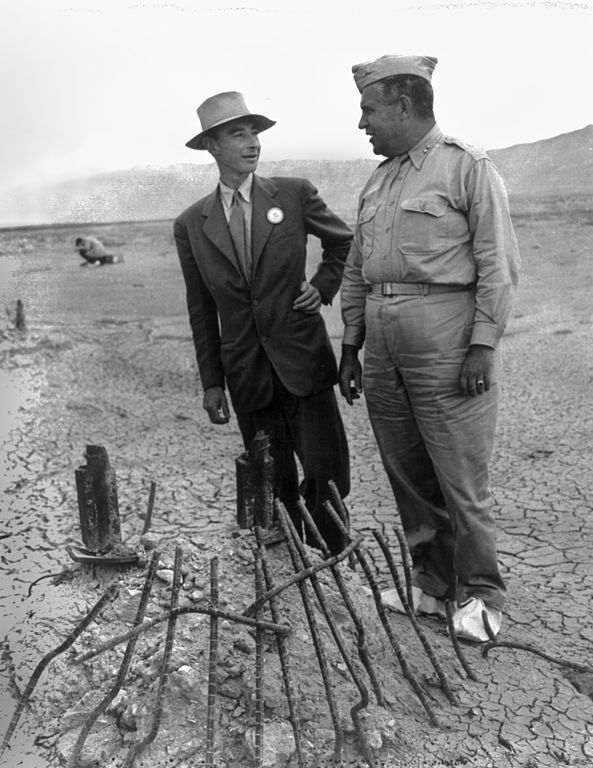His grandson explains: Why Oppenheimer remains important today
By Charles Oppenheimer | February 13, 2023
 J. Robert Oppenheimer, director of the Los Alamos Laboratory where the atomic bomb was designed, and Manhattan Project director Leslie Groves at ground zero of the first detonation of a nuclear weapon, known as the Trinity Test.
J. Robert Oppenheimer, director of the Los Alamos Laboratory where the atomic bomb was designed, and Manhattan Project director Leslie Groves at ground zero of the first detonation of a nuclear weapon, known as the Trinity Test.
On Dec. 23, 1953, J. Robert Oppenheimer received a letter informing him his security clearance was suspended as an Atomic Energy Commission consultant, pending either a security hearing or his resignation. His response: “Though of course I would have no desire to retain an advisory position if my advice were not needed, I cannot ignore the question you have raised, nor accept the suggestion that I am unfit for public service.”
By June 1954, the secret hearing had concluded and results became public—revoking his security clearance and his service to the AEC only 32 hours before it would expire. This was shocking news; having led the Manhattan Project effort to create America’s first nuclear weapons, he was a famous war-hero scientist.
Making less news but still surprising: 68 years later, in December, the Department of Energy (which replaced the AEC) announced that it has reversed the decision to remove his security clearance.
Secretary of Energy Jennifer Granholm summarized her decision in the announcement: “Historical evidence suggests that the decision to review Dr. Oppenheimer’s clearance had less to do with a bona fide concern for the security of restricted data and more to do with a desire on the part of the political leadership of the AEC to discredit Dr. Oppenheimer in public debates over nuclear weapons policy.”
As his grandson, I welcome the decision on behalf of the family, although the primary advocates were not the family but his scientific colleagues, historians, politicians and the very facts themselves. With such a public and historical figure, family members often have little control over what is said or portrayed. Over the coming year, there will likely be more attention on JRO (as we call him) than in any time since the 1950s — in no small part due to the Christopher Nolan “Oppenheimer” movie scheduled to be released in July 2023 — and the fact that he continues to be a man and a myth that people want to talk about.
While others generally speak for him instead of the family by writing books, advocating legally, making operas and movies, I believe that we have a role too in sharing his values and wisdom—especially in dealing with the problems that we face today.
Persecuting scientists for not having enough enthusiasm in bomb creation has been a black mark on our country and correcting that is a hopeful improvement. Could we be on the cusp of a growing respect and trust for science?
If we are able to learn from the history of nuclear policy, let’s look back before my grandfather’s security hearing, to the end of World War II and listen to scientists such as my grandfather and Niels Bohr. JRO often spoke of the sense of duty and responsibility for the science and technology we humans create. He thought deeply about that, and I’d hope his words and actions might be looked at for inspiration by technology creators today.
He believed in and loved science: “The deep things in science are not found because they are useful: They are found because it was possible to find them,” he said. Duty was the guiding principle in his life. During a war, there was no question that he would fight with his countrymen using all of his skills, including science. He never apologized for his role in war, but his sense of duty didn’t end with victory. He continued to feel he had a tremendous responsibility in dealing with the effects of nuclear technology.
He wasn’t alone. The scientific community had clear foresight of what could happen with nuclear technology—before the first bomb was finished during the Manhattan Project in 1945. The Interim Committee Scientific Panel provided their advice only days after the war ended. They stated nuclear weapons would proliferate and get more powerful—but never make us safer. They understood that there was no effective defense against them, and the only way to deal with their threat was international cooperation, based on science and openness.
The scientists’ advice wasn’t followed in the post-war years when JRO had peak influence as a scientific war hero and governmental adviser. Despite his efforts advocating for international control of nuclear energy, we plunged into the nuclear arms race. The military-industrial complex eventually ended Oppenheimer’s policy influence by revoking his security clearance, a move now officially recognized as corrupt.
But he was right. The politicians and bureaucrats who believed the United States could have a monopoly on nuclear weapons were proven wrong in a few short years, to the peril of us all. We have since teetered on the edge of destruction, with a peak of almost 70,000 nuclear weapons in the 1980s and many near misses involving nuclear weapons and crises. Although there has been progress—a series of treaties and international agreements have helped reduce nuclear arsenals to about 13,000 today—the danger is clearly still there. We remain only minutes away from destruction.
With some of our biggest existential threats, including climate change and nuclear weapons, it strikes me that the solution could be what the progenitors of nuclear technology suggested in the first place: more scientific cooperation, more energy, and fewer bombs.
Some problems require urgency—but climate change has produced more talk than action. We need action, and we could look at using the original Manhattan Project as a model of an urgent effort, with some of the best technologists recruited to lead it, against this existential threat, with high levels of funding and commitment. The Manhattan Project cost about $34 billion in 2022 dollars. Today, we spend $60 billion annually in the United States on nuclear weapons. There is plenty of room for prioritizing things that make the world better, not worse.
If we could revive the level of cooperation that the scientists offered as the solution to dealing with nuclear threats in 1945, we would have a better and safer future in front of us. As J. Robert Oppenheimer said: “Mankind must unite—or we will perish.” I see as much hope as peril in that statement.
Together, we make the world safer.
The Bulletin elevates expert voices above the noise. But as an independent nonprofit organization, our operations depend on the support of readers like you. Help us continue to deliver quality journalism that holds leaders accountable. Your support of our work at any level is important. In return, we promise our coverage will be understandable, influential, vigilant, solution-oriented, and fair-minded. Together we can make a difference.















